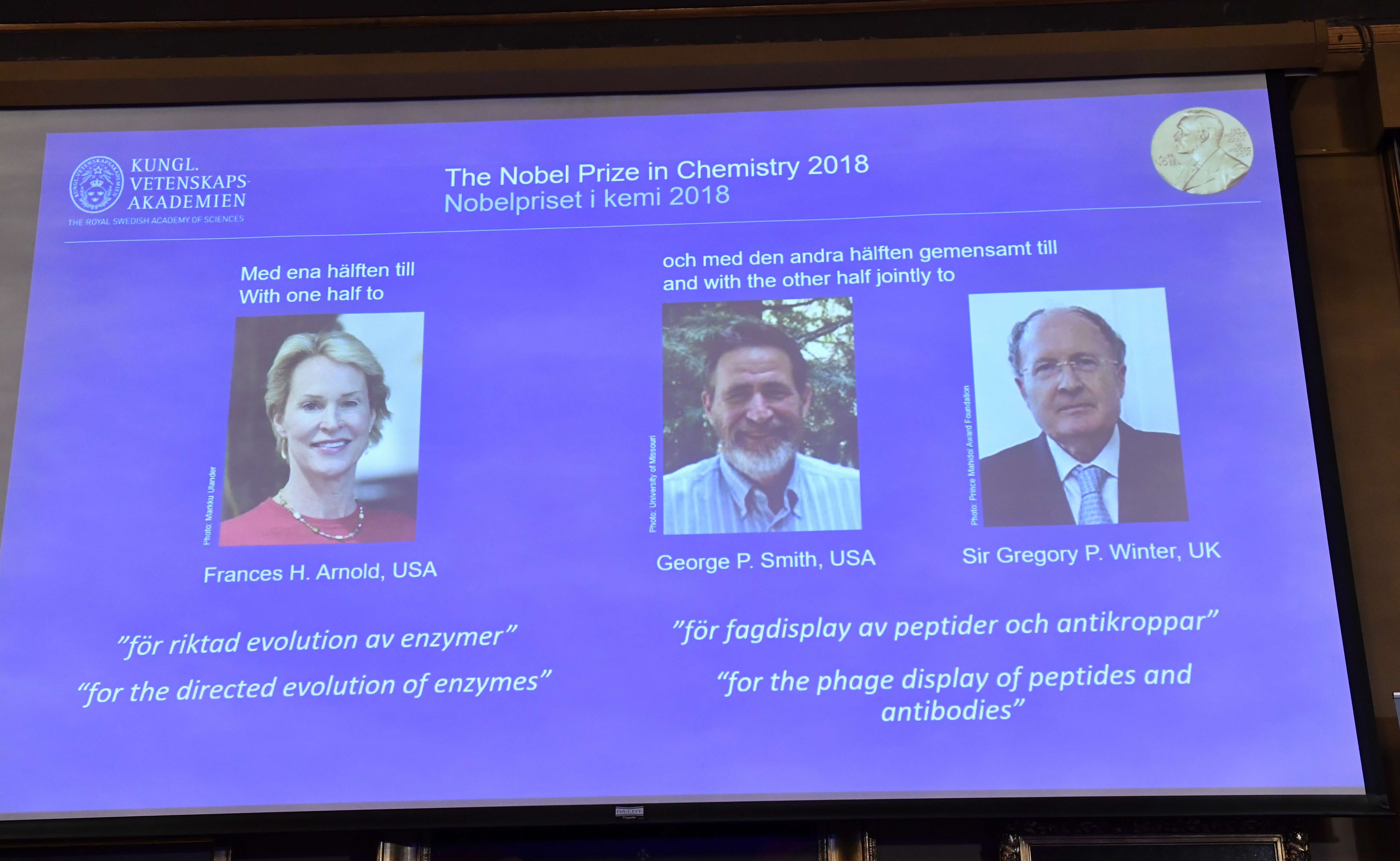‘Darwin in a test tube’: Trio wins Nobel for harnessing evolution
US scientists Frances Arnold and George Smith and British researcher Gregory Winter have won the 2018 Nobel Chemistry Prize (Jonas EKSTROMER)
Stockholm (AFP) – US scientists Frances Arnold and George Smith and British researcher Gregory Winter won the Nobel Chemistry Prize on Wednesday for applying the principles of evolution to develop proteins used in everything from new biofuels to to the world’s best-selling drug.
Arnold, just the fifth woman to clinch chemistry’s most prestigious honour since Marie Curie was honoured in 1911, won one half of the nine million Swedish kronor (about $1.01 million or 870,000 euros) award, while Smith and Winter shared the other half.
“The 2018 Nobel Laureates in Chemistry have taken control of evolution and used it for purposes that bring the greatest benefit to humankind,” the Swedish Royal Academy of Sciences said.
Life on Earth exists because over the past 3.7 billion years organisms have adapted to their environment, with evolution solving complex chemical problems: fish can for example swim in polar oceans because they have antifreeze proteins in their blood.
The trio used the principles of evolution — genetic change and selection — to develop proteins now used in a range of fields, in what is known as directed evolution.
“They have applied the principles of Darwin in test tubes. They have used the molecular understanding we have of the evolutionary process and recreated the process in their labs,” the head of the Academy’s Nobel Chemistry committee, Claes Gustafsson, told reporters.
“They have been able to make evolution many 1000s of times faster and redirect it to create new proteins.”
– ‘Bouncing off the walls’ –
Arnold, 62, who has survived breast cancer and is a single mother to three sons, is a professor of chemical engineering at the California Institute of Technology.
“I’m bouncing off the walls but I’m trying to pretend to sound calm and collected,” she told the Nobel Foundation in an interview, adding she was “annoyed” she couldn’t reach her sons to give them the news.
“They never answer the phone when Mom calls.”
Her method of rewriting DNA to mimic evolution has helped solve problems such as replacing toxic chemicals like fossil fuels.
As a result, renewable resources like sugar cane are being converted into biofuels. More environmentally friendly chemical substances are being developed, improving everyday products such as laundry and dishwashing detergents to enhance their performance in cold temperatures.
“What I do is copy nature’s design process. All this tremendous beauty and complexity of the biological world all comes about through this one simple beautiful design algorithm,” she told the Foundation.
“What I do is use that algorithm to build new biological things,” she said.
“Nature is solving all sorts of problems that we throw at her such as how to degrade plastic bottles, how to degrade pesticides and herbicides and antibiotics… she creates new enzymes in response to that all the time, in real time.”
– ‘Great surprise’ –
Meanwhile, Smith, of the University of Missouri, and Winter, a 67-year-old genetic engineer at the MRC Laboratory of Molecular Biology at Cambridge, developed an “elegant method” known as phage display, where a bacteriophage — a virus that infects bacteria — can be used to evolve new proteins, the jury said.
Pharmaceuticals for rheumatoid arthritis, psoriasis and inflammatory bowel diseases have resulted from their research, as well as antibodies that can neutralise toxins, counteract autoimmune diseases and in some cases cure metastatic cancer.
The world’s most sold prescription drug — adalimumab, which treats rheumatoid arthritis and is sold by its trade name Humira — is a result of their efforts.
Alan Boyd, president of Britain’s Faculty of Pharmaceutical Medicine, hailed the award.
“The use of antibodies has resulted in a paradigm shift in the way that we now treat so many diseases which has brought significant benefits to patients across the world and will continue to do so for years to come,” he said.
Smith told the Foundation that the Nobel was a “great surprise”.
“I thought it was one of the numerous jokes like ‘call coming in from Stockholm!’ which is kind of like a meme.”
But there was “so much static on the line (I knew) that it had to be real.”
Alfred Nobel, who created the prizes in his will, was himself a chemist, and devised his famed awards in part to atone for inventing dynamite.
The 2018 Nobel season continues on Friday with the announcement of the peace prize, and wraps up on Monday with the economics prize.
For the first time since 1949, the Swedish Academy has postponed the announcement of the 2018 Nobel Literature Prize until next year, amid a #MeToo scandal and bitter internal dispute that has prevented it from functioning properly.
Disclaimer: This story has not been edited by Siliconeer and is published from a syndicated feed. Siliconeer does not assume any liability for the above story. Validity of the above story is for 7 Days from original date of publishing. Content copyright AFP.


